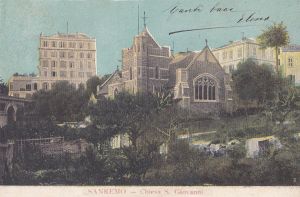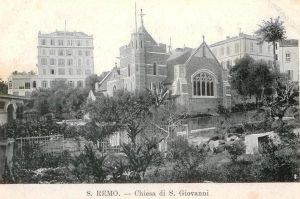Ancient Church for the English Community
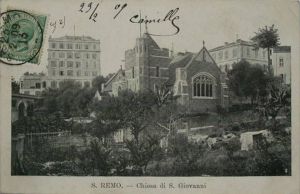 It was in Corso Regina Margherita (today's Corso Luigi nuvoloni) upstream of the Russian Church, but on the opposite side, near the Hotel Royal.
It was in Corso Regina Margherita (today's Corso Luigi nuvoloni) upstream of the Russian Church, but on the opposite side, near the Hotel Royal.
The Anglican Church had a very troubled life which ended with its "disappearance".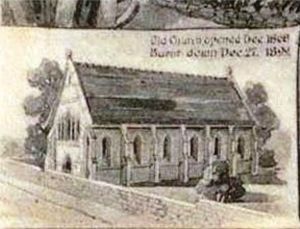 It was built in 1868, at the crossroads between Via Roma and the lower side of Via Siro Andrea Carli, in the space now occupied by the Waldensian Church, on a project by the English Architect W. Barber and on the initiative of some members of the English Community present in the city at that time.
It was built in 1868, at the crossroads between Via Roma and the lower side of Via Siro Andrea Carli, in the space now occupied by the Waldensian Church, on a project by the English Architect W. Barber and on the initiative of some members of the English Community present in the city at that time.
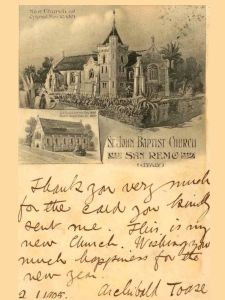 The postcard showing its stylisation bears the signature of the Rev. Archibald Toose, minister of worship at the service of the English community of Sanremo in 1905.
The postcard showing its stylisation bears the signature of the Rev. Archibald Toose, minister of worship at the service of the English community of Sanremo in 1905.
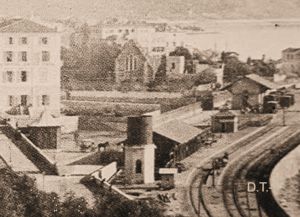 The old church can also be seen in this photo which shows the railway station of the early days and the typical façade.
The old church can also be seen in this photo which shows the railway station of the early days and the typical façade.
However, the Church was destroyed at night on 26th December 1899 by a fire caused by the distraction of those responsible who forgot to light the fire for heating when the faithful left the building after the midnight mass ceremony.
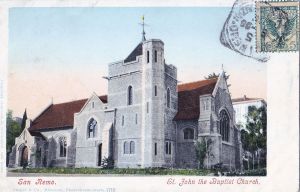 On the initiative of UK citizens living in Sanremo, it was rebuilt in 1901, in neo-Gothic style, in Corso Regina Margherita and inaugurated on 10 November 1901.
On the initiative of UK citizens living in Sanremo, it was rebuilt in 1901, in neo-Gothic style, in Corso Regina Margherita and inaugurated on 10 November 1901.
During the Last World War it was bombed and damaged so much that, after the war, it was demolished and the IRPA building was built in its place.
Some wooden panels of the Choir were taken to the English Anglican Church of All Saint Church in Corso Matuzia and should still decorate the walls of the Baptistery today.
The beautiful squared stones of the facades were instead used by Fratelli Maglio in the construction of the Astra Cinema in the 50s. And they can still be seen on the facades of this building which today houses the Upim Warehouses, on the upstream side of Via Roma.
Passing in front of them, it should be noted that the stones of the "Second" Church of San Giovanni, demolished and used for the façade of the former Astra Cinema building "faced" the very place where the "First" Church of San Giovanni was built, now occupied by the Waldensian Church. As if a "memory" of that Church "should" remain in that area of Via Roma.
In this regard it must be said that the English community was very numerous and settled mainly in the Berigo area, while the Russians were moved towards the sea on the Corso Imperatrice and the Germans in the area of San Martino to the east of the city.
Between the three communities there were relationships of respect but not of family.
In any case, the large number of postcards with which it was represented demonstrates its importance and spectacularity.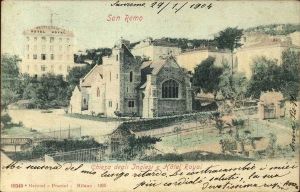
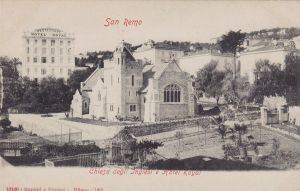
(Source: Dino Taulaigo text, elaborated; personal archive images)





